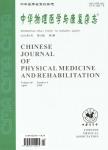Transcranial direct current stimulation (tDCS) paired with massed practice training to promote adaptive plasticity and motor recovery in chronic incomplete tetraplegia
出 版 物:《中华物理医学与康复杂志》 (Chinese Journal of Physical Medicine and Rehabilitation)
年 卷 期:2020年第42卷第2期
页 面:155-155页
核心收录:
学科分类:08[工学] 0825[工学-航空宇航科学与技术]
主 题:incomplete plasticity pairing
摘 要:OBJECTIVE Our goal was to determine if pairing transcranial direct current stimulation (tDCS) with rehabilitation for two weeks could augment adaptive plasticity offered by these residual pathways to elicit longer-lasting improvements in motor function in incomplete spinal cord injury (iSCI).DESIGN Longitudinal, randomized, controlled, double-blinded cohort *** Cleveland Clinic Foundation, Cleveland, Ohio, *** Eight male subjects with chronic incomplete motor *** Massed practice (MP) training with or without tDCS for 2 hrs, 5 times a *** MEASURES We assessed neurophysiologic and functional outcomes before, after and three months following intervention. Neurophysiologic measures were collected with transcranial magnetic stimulation (TMS). TMS measures included excitability, representational volume, area and distribution of a weaker and stronger muscle motor map. Functional assessments included a manual muscle test (MMT), upper extremity motor score (UEMS), action research arm test (ARAT) and nine hole peg test (NHPT).RESULTS We observed that subjects receiving training paired with tDCS had more increased strength of weak proximal (15% vs 10%), wrist (22% vs 10%) and hand (39% vs. 16%) muscles immediately and three months after intervention compared to the sham group. Our observed changes in muscle strength were related to decreases in strong muscle map volume (r=0.851), reduced weak muscle excitability (r=0.808), a more focused weak muscle motor map (r=0.675) and movement of weak muscle motor map (r=0.935).CONCLUSION Overall, our results encourage the establishment of larger clinical trials to confirm the potential benefit of pairing tDCS with training to improve the effectiveness of rehabilitation interventions for individuals with SCI.



